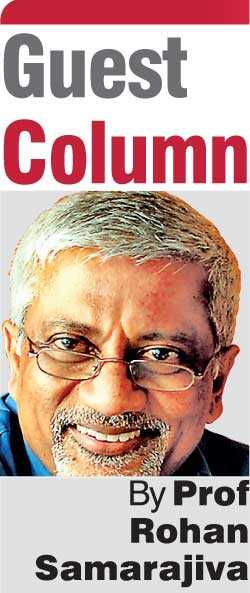Wednesday Feb 25, 2026
Wednesday Feb 25, 2026
Wednesday, 18 April 2018 00:10 - - {{hitsCtrl.values.hits}}
It was just over a year ago that I wrote in this newspaper about the need to fact check politicians and pundits (http://www.ft.lk/article/592541/Fact-checking-politicians-and-pundits). That column was triggered by an evidence-independent claim made at a public meeting by a Professor of Mass Communication about exporting rubber and importing tyres. In my response, I stated that exports of value-added rubber products such as tyres and gloves exceeded Rs. 1.7 billion in 2014. For good measure I published my column in a Sinhala weekly as well.
This is how public discourse is supposed to work. A statement is made. It is refuted with evidence. With or without a formal apology or a retraction, the correct facts become part of public discourse.
But apparently not.
 A few days back a column was published in this very newspaper with the caption ‘Exporting rubber and importing erasers!’ Its author is a regular columnist in this newspaper, who may be assumed to be aware of what is published in it. But he is not some simple academic like the individual who provoked my earlier response. He also functions as a key official in a Government organisation that directs scientific and technological activity in the country. He is an academic in a position of power.
A few days back a column was published in this very newspaper with the caption ‘Exporting rubber and importing erasers!’ Its author is a regular columnist in this newspaper, who may be assumed to be aware of what is published in it. But he is not some simple academic like the individual who provoked my earlier response. He also functions as a key official in a Government organisation that directs scientific and technological activity in the country. He is an academic in a position of power.
One thing that persons with academic training, especially those of us with PhDs next to our names, are expected to do is to pay due regard to prior knowledge. So I was thinking that perhaps the fault lay with me. After all, I had just written a newspaper column. I had supported my argument with the actual amount earned from value-added rubber exports in 2014, but had not given the source of my data (which is the custom in academic writing, but not in op-ed writing). Was this why the untruth is being repeated?
Those of us who work on policy matters draw our evidence from Government or industry associations, as I had. But some believe that what has been published in peer-reviewed academic journals is of the highest quality. Was it because I had not cited such articles? Or was it because the relevant information was not easily accessible online?
There is an academic article that documents the tremendous advances made in value addition to the rubber produced in this country: “Export performance of rubber products manufacturing sector in Sri Lanka,” in Volume 93 of the Journal of the Rubber Research Institute of Sri Lanka (pages 51-61). It was published in 2013 and is available online.
J.K.S. Sankalpa, W. Wijesuriya and P.W. Jeewanthi who based their analysis on 2007-2012 data, conclude thus: “Sri Lankan external trade in rubber and rubber products has been dominated by the value added rubber products consisting of 11 product groups from HS codes 4007 to 4017. By looking at the rubber exports, following points can be illustrated: (i) despite market recession in year 2009, the country has been maintaining a favourable balance of trade throughout the six year period; (ii) the average share of the value of finished products exports was 81% from total exports in year 2007 changed to 83% in 2012; (iii) year on year average growth rate of the total value of rubber finished products exports was 36% from year 2007 to 2008 and it decreased to -10% from year 2011 to 2012.”
So the ratio of value-added rubber products (such as solid and pneumatic tyres, surgical and household gloves) to the kind of rubber referred to in the caption of the previous week’s caption has been four to one for a long time. For every rupee earned by exporting rubber more than four were earned by exporting value-added products far more complex than erasers.
The eraser exemplifies the problem of the kind of industrial policy being promoted by bureaucrats or academics who have no skin in the game, who want to decide how other people’s money should be spent.
They do not know that the demand for erasers is likely to be in decline because fewer people use pencils today than when they went to school. They do not know that entrepreneurs who risked their own money and those of their shareholders succeeded in capturing export markets for products that were actually in demand in 21st Century export markets. Ideological blinders prevent them from understanding that decentralised decision making within the context of markets is far superior to their evidence-independent ruminations.
It’s important that public discourse be based on correct facts. It’s expected that anyone who participates in shaping public policy takes the trouble to look up easily accessing data. It’s imperative that adequate attention be paid to Sri Lanka’s comparative advantages discovered through the entrepreneurial activities of investors.
Public discourse is polluted by experts who don’t take the trouble to get their facts straight. If policymakers do listen to such ideologically-driven and evidence-independent advice, the economy will be burdened by eraser factories that will put to shame white elephants such as the now thankfully closed Salawa plywood factory.